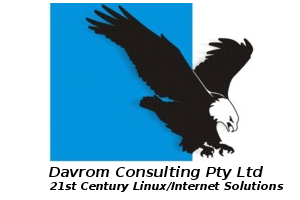





Back to Newsletters KEYWORDS=open unix 8, seminar, gui, netscape, messenger, hp, omnibook, DAVROM CONSULTING Newsletter - Issue # 1 Dated: Tue May 29 2001 From the Desk of David Clark Welcome to the first issue of the DAVROM CONSULTING Newsletter. As most of you have no doubt anticipated from my previous e-mails, I will be branching out on my own as an independent consultant and have already started to assist some of my old contacts in a UNIX support capacity. My wife Rose-Marie will be the administrator of DAVROM CONSULTING and we are both looking forward to this opportunity with great excitement. Our initial charter will be to offer SCO and Stallion support to the reseller and end-user base, much the same as I did with MUA. We will also be moving into the areas of Caldera, RedHat, Solaris and HP-UX. Basically the word "UNIX" will get our attention. I have set up an intial web site at which you can check on the latest support rates and offerings as well as access this and subsequent newsletters: http://home.iprimus.com.au/dmcrmc/davrom/index.html I would like to thank the reader for taking the time to read this newsletter. SCO/Caldera Seminar On Tuesday the 19th of June, in Brisbane, SCO/Caldera will be holding a free seminar introducing and discussing their current and future product directions with Caldera Linux and the existing SCO offerings of OpenServer and Open UNIX 8 (there's going to be an OpenServer 5.0.7....). To register please go to: http://www.sco.com.au/caldera_signup or e-mail: anz_info@sco.com or phone: (612) 99661999 or fax: (612) 99551077 From my point of view, and recently re-enforced by an observation expressed by an industry colleague a few days ago, Australia has always been and is very much still an SCO OpenServer install base. As I indicated in one of the last MUA-Tech Newsletters, SCO OpenServer will be around in the install base for many years to come and the fact there is a version 5.0.7 coming out shows the continued comittment by SCO/Caldera to address those customers who have based their business on this powerful and versatile version of UNIX. Having said this, there are distinct advantages to installing Caldera (Linux) and UnixWare7 where applicable. Obscure Laptop Drivers I currently use a HP OmniBook Xe2 laptop for my day-to-day UNIX support and when I first decided to load 'UNIX' on it, I was amazed at the battle I was to have. Given this laptop explicitly states it is "Designed for MS Windows and NT", I figured it was Intel so it had to support UNIX drivers as well - and then I found myself lost in a sea of frustration. This particular laptop uses a Silicon Motion SM8xx chipset for the video adapter/screen and a Xircom ethernet adapter. Both of these devices worked fine under Windows98 once I downloaded the 16MB driver file(s). My initial attempt to install OpenServer went well but the GUI screen was always blank and despite the failed attempts at hacking, I moved onto UnixWare7 - strike 2, more screen display but far from ideal and no network card drivers. Next I tried both Caldera and RedHat which after much researching on the Internet and being brave enough to hack into some of the X86Free configs, I got everything going - one week of battling finally paid off. The laptop is currently running RedHat 7.0 perfectly with full GUI and networking. At one point I even attempted to load Solaris for Intel but this met with the same results as SCO - Solaris has a wide range of drivers but the GUI screen would just never work. This article is by no means a comparison of UNIX systems but if you are considering purchasing a laptop with the view to running UNIX on it, I highly recommend you check out the screen and supported network cards (PCMCIA) and spend some time on the Internet searching for any web pages of discussions on your intended laptop model. UNIX GUI E-mail Readers I have recently evaluated two UNIX GUI based e-mail readers for my UNIX environment as I use RedHat and SCO OpenServer for my e-mail interface to the world. The best I have found so far and the most recent two I have actively used are Kmail (part of the KDE install package) and Netscape 4.77's Messenger (which is part of Netscape Communicator). Both of these programs store e-mail in ASCII text which suits my environment as I have UNIX shell scripts that read and process the e-mail files (mailboxes or mail folders). Because Kmail and Netscape Messenger store e-mail as standard ASCII text this helps me to switch between the GUI and non-GUI environment - (LONG LIVE ASCII TEXT!!!). I used Kmail for some months and it is an excellent e-mail program and is linked to the other KDE suite of utilities for web browsing and file viewing/manipulation. I am now using Netscape Messenger from Netscape Communicator 4.77 as Netscape Navigator is my browser of choice and completely integrates with all Netscape modules. (Slight bug with the address book but it is easily fixed.) Back to Newsletters 





Website design by Davrom Consulting Pty Ltd This site is fully tested with Google Chrome and Firefox web bowsers Home Page | Support | Misc | David's Pages | Podcasts | Contact Us | Blog |
